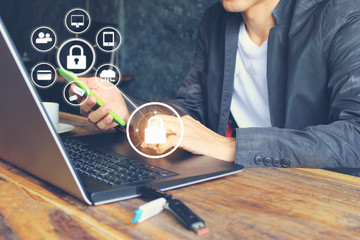The COVID-19 virus has come unexpectedly, leading to lockdowns in several countries. As one of the ways to fight the virus, health experts have recommended ‘stay-at-home’ measures and social distancing. As a result, this has led to workplaces being closed down.
Workplaces have resorted to using the internet as a medium to facilitate work while employees are at home. Technological advancement in the last 3 decades is beginning to pay off as workers can carry out office duties right from their living rooms, providing they have a good, reliable connection from a provider like starlink internet. As convenient as this temporary transition is, it also carries certain risks to workplaces.
The risk of device and network breaches have increased due to heavy reliance on the internet in these times. There are cybercriminals that aim not only to breach your personal security but that of your remote workplace, especially if you don’t know what a VPN is.
Cybersecurity Risks Associated with Remote Work

Free Wi-Fi
Although lots of individuals would be working from home with their Wi-Fi networks, some could decide to step out to get food or beverage supplies. While doing this, you could connect to insecure free Wi-Fi in that coffee shop or food store to wrap up a few things on your online workplace.
The issue is that a lot of public Wi-Fi networks are connected to hackers aiming to spy on your online activity. The cybercriminal could facilitate this by cloning his/her network to look like real public Wi-Fi. It could also be done through a Man-in-the-Middle attack where the hacker hijacks communication between your device’s internet connection and the Wi-Fi network. This is why it is so important to have adequate security in place on your phone (which you can click here to learn more about) in order to protect yourself and your data from these hackers.
Malware
Since you’d be working from home, you’ll most likely use your personal devices and home network to connect to your remote workplace. Your personal device and network could have low cybersecurity levels relative to that of your work device and network. Hence, both would be easy targets for malware.
Malware could be sent through email attachments. Malware can also be gotten through various websites that host files containing them. If the file containing the malware is download and installed, your device would become infected.
To an extent, malware can be remotely controlled by a hacker which would facilitate commandeering of your computer. A dangerous form of malware is ransomware, where your data would be seized in exchange for money. If remuneration is not made, sensitive workplace data could be released on the internet, which could be pounced on by business competitors.
Improving Cybersecurity for your Device
Use Secure Passwords
It is very essential to have strong passwords for your workplace account. One common mistake a lot of people make is to use the same password for different accounts. In this case, a hacker could easily guess the password to an employee’s workplace account if the worker’s social media or email login detail is acquired.
A secure password consists of a mix of both upper and lower case letters, numbers, and characters. If you find it hard to remember all your passwords because they’re so complicated, you could use a password manager. Just remember that a complicated password is an obstacle to a hacker.
Utilize a VPN
If you’re not familiar with the term VPN, it stands for Virtual Private Network. VPNs encrypt online traffic flowing between a device and its Internet Service Provider (ISP). It also reroutes your location through a server of your choice, ensuring that your location remains hidden and your online privacy boosted. If you stream a lot, you should go for a VPN that offers dedicated streaming servers, such as cyberghost vpn. It is also secure and user-friendly.
If you make use of public Wi-Fi a hacker is connected to, if the hacker attempts spying on your activity, the information would be unreadable. A VPN can protect you from corporations and even the government as well.
Use Two-Factor Authentication
If a hacker gets a hold of your workplace login details, two-factor authentication will serve to keep the criminal out. Two-factor authentication can be described as added security for an account.
For instance, if the hacker gets your password and attempts to log in, two-factor authentication would require facial recognition, fingerprint, or a password from an authenticator application. Without having your code or fingerprint, the hacker would get frustrated and abandon your account.
Be Suspicious of Emails
Phishing is one of the oldest hacking tricks on the internet. It is quite certain that the number of phishing attacks will increase due to the increased use of the internet.
To identify a phishing email, scrutinize the sender’s email address and content body of the mail for spelling mistakes. Drag your computer arrow to the link displayed in the email to see where it leads to. If the website looks suspicious, do not click the link.
You can also check for the HTTPS padlock symbol in your browser’s address bar if you do click the link in the mail. Phishing websites do not typically use HTTPS websites. To further ensure you’re on the right website, take a look at the domain name. Phishing websites use misspelled domain names. If you want to go further in ensuring you are safe, you can pay an internet security firm to keep you protected.
Use an Antivirus and Activate Firewall
Firewalls typically prevent malware from being installed on your system. They serve as barriers between your device and the internet. Most people tend to deactivate firewalls because of the annoying pop-ups. Make certain you reactivate that of your system to improve the system.
In the event that malware does get onto your device, an antivirus can clear it after running a security scan.
Conclusion
Because of the coronavirus, and strict social distancing guidelines, workplaces are making full use of remote workplaces. It is expected the hackers would be up in arms to hack as many devices as possible through malware, phishing, and Wi-Fi spying. You can avoid this by using a VPN, an antivirus, scrutinizing your emails, and activating your device’s firewall.








